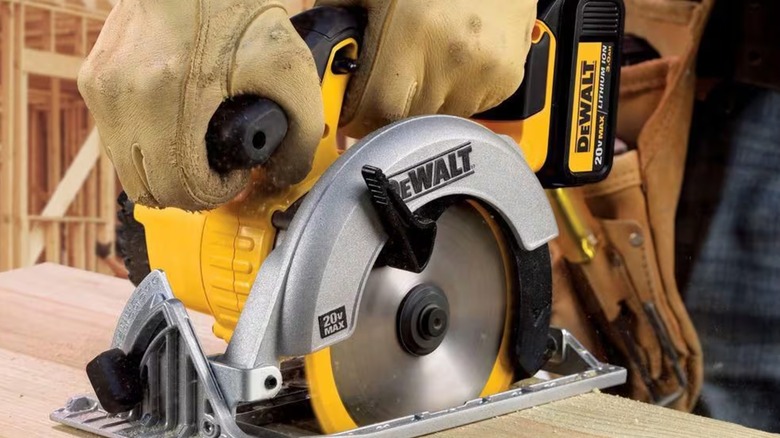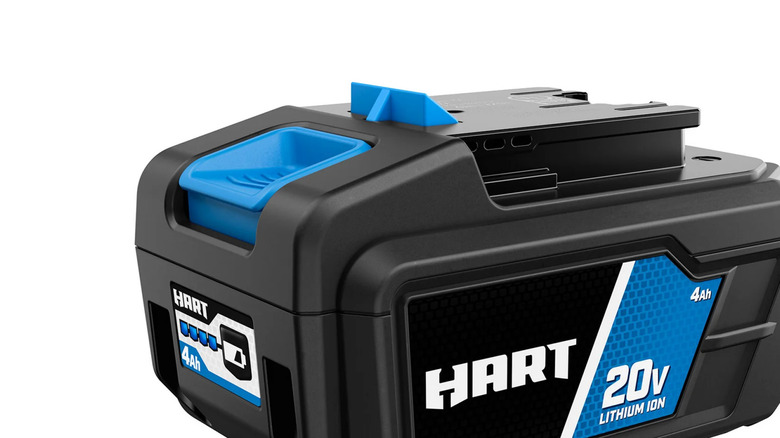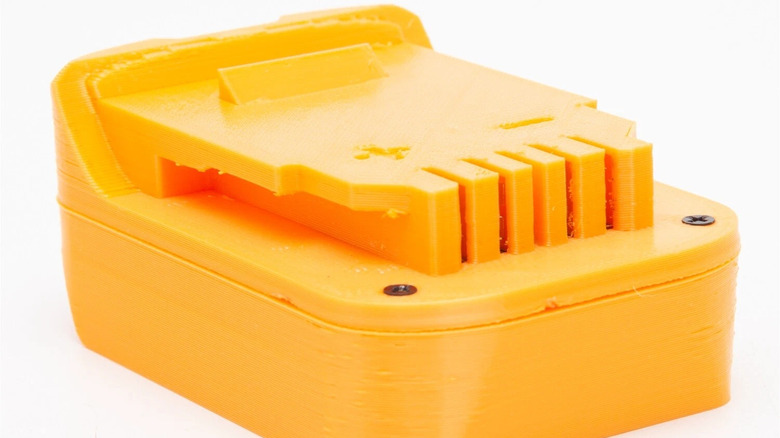Are Hart Batteries Compatible With DeWalt Tools?
We may receive a commission on purchases made from links.
We all have particular brands we like to stick to. For example, if you're engaged in some hobby crafting in your garage or work as a professional contractor, you probably have a brand of power tools you prefer over others for your personal tool kit, such as DeWalt. Let's say, however, that you suddenly find yourself in dire need of a fresh battery to power your DeWalt tools. You pop into the nearest Walmart in hopes of finding one, but the only power tool batteries you can find on the shelf are those belonging to the Hart brand. You might think, "Well, a battery's a battery, so surely this will work as a replacement," but unfortunately, life is rarely so accommodating.
Just about every brand of power tool and battery is wholly independent in their designs and functions, which means you can't use one brand's batteries with another brand's tools. Naturally, this extends to Hart and DeWalt as well; Hart batteries are not compatible with the receivers on DeWalt tools, and cannot be used to power them on their own. The only way you could potentially overcome this would be to use a third-party adapter to facilitate a connection, but using third-party accessories poses risks both to your tools' safety and your own ability to get them serviced if something goes wrong.
Hart batteries cannot be inserted into DeWalt tools
At a casual glance, Hart and DeWalt's battery packs look very similar. If you placed a Hart 20V 4Ah battery side-by-side with a DeWalt 20V MAX battery, you could definitely spot identical elements like their solid black bottoms and their frontal release switches. However, these little similarities don't make up for the major, connection-defying differences, particularly those found on top of the batteries. A Hart battery pack's top connector consists of a flat panel with two divots on the side and a large, recessed area in the middle containing its power transfer terminals, plus straight-line connector rails on the sides. A DeWalt battery, meanwhile, has a more traditional comb-shaped panel with five divots concealing its terminals, as well as connector rails that bend out at a sharp angle.
These physical differences would prevent a Hart battery from properly attaching to a DeWalt tool; the connector rails simply wouldn't fit. Even if you could somehow force a Hart battery to flush-fit with a DeWalt tool's receiver, the differences in shape and placement of the power terminals would prevent any electricity from actually flowing from the battery to the tool. A DeWalt tool's receiver is precisely designed to link up with a DeWalt battery, and no other battery is properly shaped. Technically, there are non-DeWalt tools that can receive DeWalt batteries, but these are unofficial products built specifically to do so, and the connection wouldn't go both ways.
There may be adapters available, but using them could result in problems
As nice as it would be to buy any random battery in a big box store and slap it on any random tool, having that kind of functionality would be a technical and legal nightmare for brands and manufacturers, which is why they prefer you just stay within their ecosystems. Of course, brands can only control what goes on under their own banners, which is where third-party accessories step in. In this particular case, there's a surprisingly extensive unofficial sector of battery adapters designed to facilitate connections between specific power tool brands' batteries and tools. These adapters are often found on platforms like Amazon and eBay, or small websites like Power Tools Adapters. These adapters feature compatible connectors on their tops and bottoms, facilitating a connection between a Hart battery and a DeWalt tool and allowing power to flow.
It's worth stressing, though, that connecting a battery to a tool via an adapter is not without its risks. All power tool batteries, including Hart's, contain a small circuit board in addition to the actual power storage that directly interfaces with connected tools. These circuit boards ensure the power delivery is safe and optimized for whatever tool you're using. When you attach an adapter, however, that circuit board is completely circumvented, forcing power through. Your DeWalt tool may turn on, but if there's a power mismatch from the battery, you could either get insufficient, underwhelming performance or far more power than the tool can handle, overloading and burning it out. If either your battery or tool is damaged through the use of a third-party adapter, neither Hart nor DeWalt will offer replacements or service, as using any kind of third-party accessory is a violation of both of their warranties.


